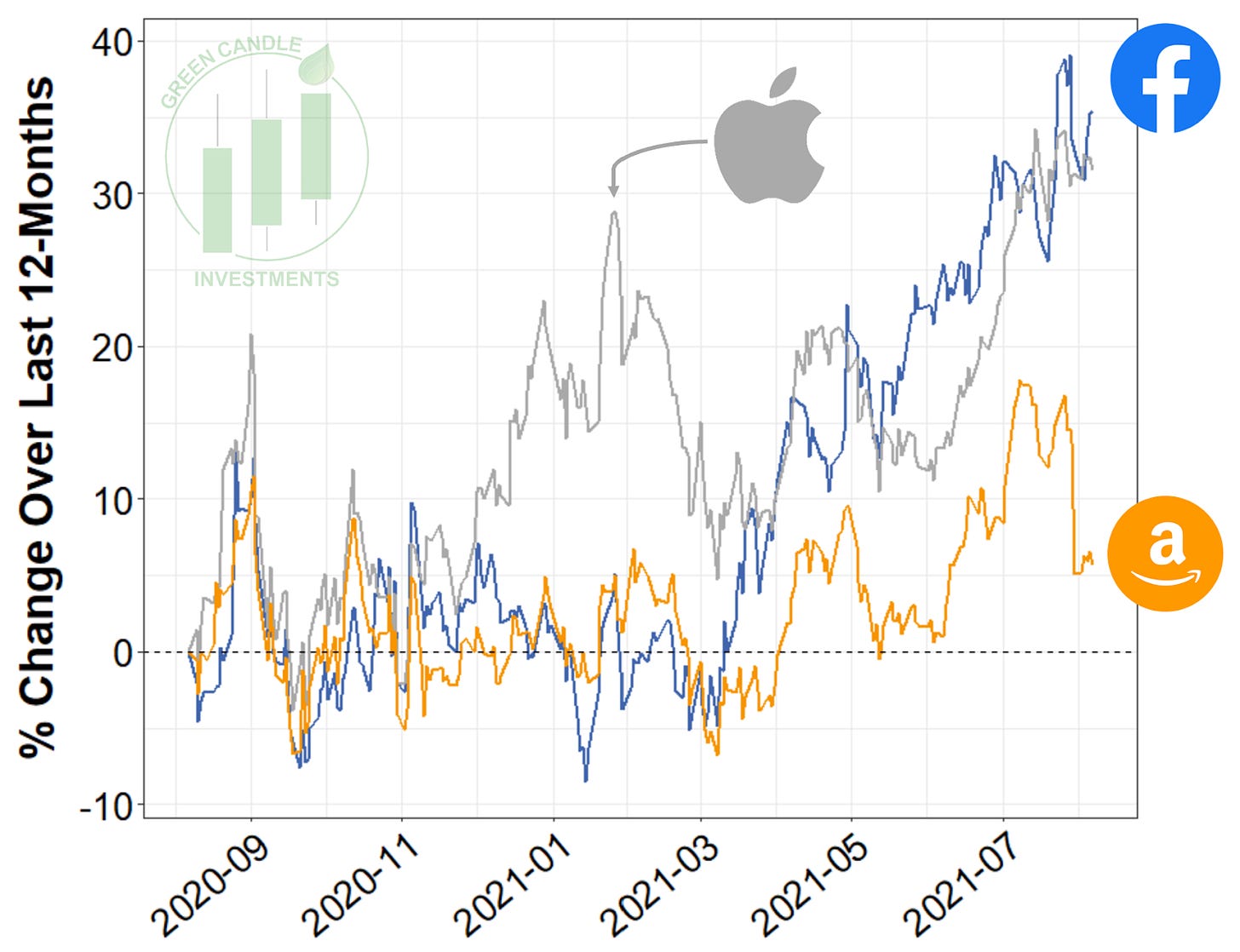Apple Inc. (Ticker: AAPL) - Brief Breakdown
In our Brief Breakdowns, we pick a stock and take opposite sides – one of us presents the bullish argument and the other presents the bearish argument.
In the coming weeks, we will be covering the FAANG stocks (Facebook, Amazon, Apple, Netflix, and Google) because of their size and popularity. These will be coupled with our new Wednesday newsletter, which covers basic investing information. If you haven’t already, subscribe to our newsletter here to get our articles delivered directly to your inbox and follow us onTwitter, Instagram, and YouTube for the most up to date information on Green Candle!
Company Description
Apple Inc. is an American multinational technology company that specializes in consumer electronics, computer software and online services. Apple designs, manufactures, and markets smartphones, personal computers, tablets, wearables, and accessories worldwide. Apple famously offers the iPhone, Mac line of computers, iPad, Apple watch, AirPods, Apple TV, Beats products, HomePod, iPod touch, and other Apple-branded and third-party accessories. Apple even has Apple Arcade as a game subscription service, Apple Music, Apple News+, and much more. Apple was the world’s largest technology company by revenue in 2020 (totaling $327 billion) and as of 2021 is the world’s fourth-largest PC vendor by unit in sales as well as the fourth-largest smartphone manufacturer. Apple is one of the Big Five American information technology companies along with Amazon, Google, Netflix, and Facebook. We previously broke down Facebook and Amazon, and will be breaking down Netflix and Google in the coming weeks.
Quantitative Analysis
At the time of this writing (8/8/2021), AAPL is trading at $146.14 with a market cap of $2.42T and a 52-week range of $103.10 - $150.00. Apple released its most recent quarterly earnings on June 26th, which reported a record revenue of $81.4B (+36% year over year), earnings per diluted share of $1.30, and $21 billion of operating cash flow. Apple also issued a dividend and AAPL paid a $0.22 per share dividend in Q3 of 2021 which is a 7% increase from Q1 of this year. Return of equity (ROE: Net Income / Total Equity *100) of Apple Inc. is 131.01%, the price to earnings ratio (P/E) is 28.61, and net margin (net income / revenue) is 25%. This financial analysis was done using financialstockdata.com (become a beta tester here). You can view AAPL’s 2021 Q3 earnings here and their 2020 Annual Report here.
Qualitative Analysis
Apple is a tech giant. There are more than 117 million iPhone users in the United States, accounting for 47% of the total smartphone market. On top of mobile phones, Apple has a 7.4% share of the PC industry. If AirPods were a standalone company, it would have a market valuation of more than $175B, making it the 32nd largest company in the United States. Although Apple started as a computer company, it has gradually transformed and diversified via strong commitments to R&D and innovation. Apple has become dominant in multiple sectors, even creating a tablet sector which previously did not exist. Apple has been able to accomplish this growth despite a history of relatively unstable leadership. Apple is a global tech giant that continues to grow and widen their moat.
Bullish Thesis
Here are three points to support the bullish thesis:
Product diversity: Apple, which was originally founded as a company focused on desktop computers, has now expanded into laptops, smartphones, audio technologies, tablets, and cloud-based storage and computing. The Apple I - Apple’s first product - was released in 1976, followed by the Apple II released the following year. Throughout the 70s, 80s, and 90s, Apple continued to create and release PCs and PC-related technologies. In 2001, Apple released the first generation iPod, which transformed the way people listened to music on the go. In 2007, Apple transformed the mobile phone industry when they introduced the first iPhone. They released the iPad in 2012, the Apple watch in 2015, and AirPods in 2016. If Apple can continue to innovate products in existing markets and expand into new markets, look for the company to continue to rise in value.
Stickiness: Apple not only has a large repertoire of device types (phones, computers, etc.), but they’ve also mastered device interconnectivity. Via iCloud technology, device synchronization is relatively straightforward with Apple products. On top of product integration, Apple has nailed UI/UX. Their products are very easy to use, even for new customers. Device interconnectivity and user-friendliness are two characteristics of Apple products that make them incredibly “sticky” with customers. Once users have started using Apple products - and sending their data to iCloud - it becomes difficult to justify switching to a different brand. Having “sticky” products is great for Apple and bad for their competitors.
Ability to shift into new markets: Apple has the ability to expand into new markets by leveraging user data. While most major tech companies monetize user data via advertising, Apple has an opportunity to leverage this data in other ways. For example, many of Apple’s mobile devices, including their phones and watches, capture human health data (heart rate, step counts, etc.). Such health data could be used within healthcare (e.g., remote health screenings for people in remote areas) and insurance settings. The built-in sensor suite of the iPhone includes accelerometers, gyroscopes, and GPS, all of which provide access to a wealth of user data. If Apple can strategically utilize this data - and do so in ways that do not cause mistrust in their customers - they may be able to create new revenue streams.
Bearish Thesis
Here are three points to support the bearish thesis:
Litigation: Similarly to other giants like Facebook and Amazon, Apple has become all too familiar with lawsuits. Apple currently has an antitrust trial with Epic Games, the creator of Fortnite, which claims that Apple has built a monopoly over iPhone and iPad games by requiring all apps to be downloaded through its Apple App Store. Epic Games claims in the lawsuit that Apple extracts unfairly high fees from developers which can be up to 30% of all transactions and the App Store requires developers to use Apple’s payment system. Because Apple is a large company, it will continually have companies and people suing them and unfortunately that is the reality of having a large corporation. Hopefully Apple can have a favorable outcome, but if not this could mean changes to AAPL’s margins which could lead to less revenue.
Supply Chain Disruption: COVID-19 presented a lot of challenges, but one of the biggest challenges was the disruption to the supply chains out of China. It seemed for a bit that the vaccine was leading to less disruptions and more openings, but now with potential variants it is not clear how the U. S. will handle the situation. Hopefully Apple learned from the first shut down, but if not another disruption to the supply chain could cause negative effects for the business in the short term.
China Data Hack: Currently Apple is attempting to get in to the Chinese market, but it has led to difficulties. Apple was preparing to store the personal data of its Chinese customers on computer servers run by a state-owned Chinese firm. Tim Cook has attempted to say that the data is safe, but Apple's data center in Guiyang has largely ceded control to the Chinese government. Chinese state employees physically manage the computers and Apple has abandoned the encryption technology it uses elsewhere after China has not allowed it. This sentiment has worried many that data is not safe with the Chinese government. Hopefully Apple can work this out to keep the privacy of their customers out of the Chinese government’s hands.
Learn more about Apple here. Stay up to date on Green Candle by subscribing to our newsletter and following us on Twitter, Instagram, and YouTube!
Have a great week everyone,
Brandon & Daniel
Disclosure:
The article was written by Daniel Kuhman and Brandon Keys, and it expresses the author's own opinions. They are not receiving compensation for it. They have no business relationships with any company whose stock is mentioned in this article. The information presented in this article is for informational purposes only and in no way should be construed as financial advice or recommendation to buy or sell any stock. Brandon and Daniel are not financial advisors. We encourage all readers to do further research and do your own due diligence before making any investments.




